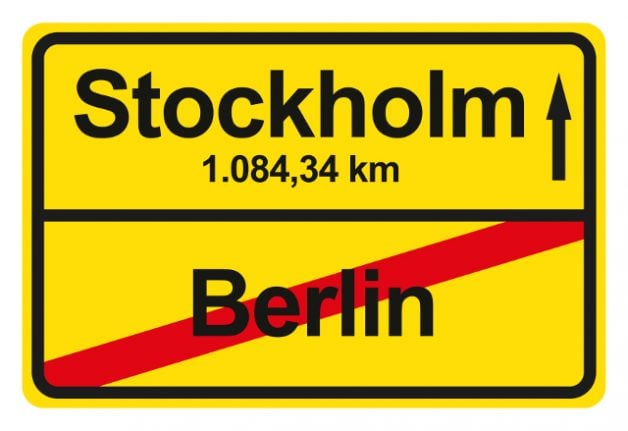Moving from Berlin to Stockholm was not a culture shock, but sometimes I still feel like a foreigner in the wrong place and have the need for a homey feeling from time to time. I actually met some of my close German friends here in Stockholm while buying pretzels at Lidl. But I figured out other places to meet Germans or get some German culture while still living in Stockholm. Here’s a free prescription to cure the homesickness.
READ ALSO: Eight ways Germany and Sweden are miles apart
Shopping at Lidl, Media Markt and finding Club Mate
As soon as you enter Lidl the chances are high that you’ll hear some German, and you can finally get a proper pretzel, which could be a nice alternative to all the cinnamon buns and kladdkaka you’re having on the other days during fika. A nice side effect: it doesn’t just feel like going grocery shopping in Germany, it also almost feels like paying a bill in a German supermarket, money wise.
On a personal note, I’m just as happy to have discovered a reliable source to get Club Mate, a caffeinated mate-extract beverage: the Ica supermarket at Folkungagatan is officially saving German hipster reputations (other Stockholm supermarkets also stock the drink). It's just across from Lidl, which can’t be a coincidence. People who are more enthusiastic about electronics than food should try Media Markt for a similar effect.
READ ALSO: Five irks and quirks for a Czech in Sweden

Make Lidl your comfort zone. Photo: Hasse Holmberg/TT
Find likeminded Germans online
For some general small talk, more advice on how to survive as a German in Stockholm, and to find out which pub is showing your favourite football team’s game, try the Facebook group “Deutsche in Stockholm” or “Tyskar i Sverige.”
READ ALSO: 14 things that shock French people about Sweden

Through the “Deutsche in Stockholm” Facebook group Germans are connecting within the Swedish capital. Photo: Leif R Jansson/TT
Enjoy a traditional German dinner
Returning to food, to get a German meal like bratwurst, spätzle or schweinshaxe served along with a weissbier and a schnaps for dessert, visit to the Bierhaus on Tegnérgatan in Stockholm’s Vasastan.
For a quicker fix, visit Günter's korvar, a traditional bratwurst stand founded by a German and also located in Vasastan.
READ ALSO: Eight strange things that surprised this Brit about Sweden

Traditional German Bratwurst and Sauerkraut at the Bierhaus in Vasastan. Photo: Tomas Oneborg/SvD/TT
Connect with back home during the summer months
The easiest way to cure homesickness would be to just book a ticket and travel home to Germany. Though that might sound like letting the homesickness take over, during summer it can be a good idea since most of your Swedish friends are going to be off on vacation for a whole month anyway.
READ ALSO: Ten Swedish phrases you only hear in summer

Several Airplanes leave daily from Stockholm Arlanda Airport to Germany. Photo: Christine Olsson/TT
Join a German community in Stockholm
For those in need of a stronger and more long-term German culture treatment without travelling back home, my advice is to get involved with German communities in Stockholm.
The Stockholm German Church, Sankta Gertruds kyrka (or St. Gertrudes Gemeinde in German) offers German language services and a lot of opportunities to volunteer and attend events.
To find a German community not based on religion, events organized by the Goethe Institute can be attended if you want to meet other Germans or at least people that are interested in German culture and language.
For university students, it’s important (and easy) to join the student union and their international programmes, chances are around 99.99 percent that you’ll meet fellow German students.
READ ALSO: Ten ways being an international student in Sweden changes you

Meeting up with other Germans to chat and laugh in the mother tongue. Photo: Simon Paulin/imagebank.sweden.se



 Please whitelist us to continue reading.
Please whitelist us to continue reading.